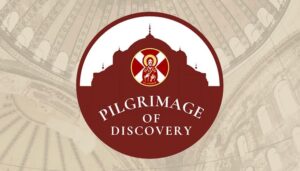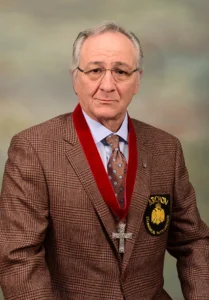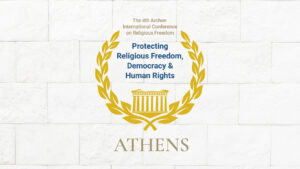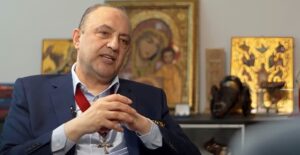Since 1974, the Turkish occupation regime has been pursuing a policy of pillage, destruction and desecration of the cultural heritage of Cyprus; this has led to the destruction or desecration of more than 500 Greek Orthodox churches and chapels in the occupied areas of Cyprus and the illegal transfer of more than 60,000 ancient artifacts to third countries.
The Turkish occupation of Cyprus continues to violate the Third Vienna Agreement of August 1975, which is still the only agreement providing for the treatment of Greek Cypriots living in the occupied areas of Cyprus. The Order of Saint Andrew calls upon Turkey to fully respect the religious freedoms of the Greek Orthodox Christians who continue to live in the northern occupied part of Cyprus and urges the United States Government to condemn this unlawful occupation and work towards truly safeguarding the basic human rights and fundamental freedoms, including the religious freedom, of the Orthodox Christians who reside there.
For previous ChristianPersecution.com coverage of the persecution of Christians in occupied Cyprus, see here.
“Occupied Cyprus: How Turkey has destroyed Christian cultural heritage,” by Uzay Bulut, Christian Post, May 26, 2022:
While Russia’s invasion of Ukraine is ongoing, an EU member nation remains occupied, ethnically cleansed and colonized by a NATO member — and this for the past 48 years. I’m referring to the continual occupation of the Republic of Cyprus by Turkey.
Much of the cultural and religious heritage of this ancient nation has been obliterated by Turkey. The Turkish invasion brought with it destruction to non-Muslim historic sites, including the cultural heritage of Greek, Jewish, Armenian, Latin, Maronite, and other communities. In spite of this, the West has largely remained silent.
The illegal invasion and forced division of Cyprus by Turkey in 1974 based on the religion and ethnicity of its residents, has led to countless human rights violations including cultural heritage destruction and systematic discrimination — even regarding death and burial.
Ninety-year-old Greek Cypriot citizen, Spyros Hadjigregoriou, for example, lost his life in November of last year due to a brain hemorrhage. He died in his native country, Cyprus, deprived of his greatest wish: being buried in his village of Gerolakkos. Nicosia has been illegally divided in two by Turkey, which occupies part of the city. After the invasion campaign, in violation of international law, Turkey established an illegal regime in the occupied north of Cyprus.
Hadjigregoriou spent decades trying to receive “permission” from the de-facto Turkish “authorities,” including the presidents of the occupying regime in the north of the Republic of Cyprus. His constant requests and appeals were of no use. The Turkish occupying forces did not allow him to rest in peace in the village of his ancestors.
Since its occupation in 1974, 36% of Cyprus has remained under Turkey’s rule.
Sener Levent, a Turkish Cypriot journalist, and editor in chief of the newspaper Avrupa, has extensively covered Hadjigregoriou’s story: “I wrote my first article about Spyros in the late 1980s,” Levent said. “My newspaper continued covering his story for years until his death. Spyros was a peace activist who hosted events in his house to bring together all Cypriots. He was a good friend of mine, and we once went to the cemetery of his village together. Most gravestones were no longer in the cemetery. But he still yearned to be buried there.”
Around 40,000 Turkish troops are still illegally deployed in the northern part of Cyprus. Forced mass displacement occurred when Turkey invaded Cyprus twice in 1974 — on July 20 and August 14 — 14 years after Cyprus gained independence from British rule and became an independent republic in 1960. Like the rest of the island, the northern part of Cyprus’s population was Greek majority until the invasion, which forcibly changed the demographic character of Cyprus.
The military campaign was characterized by murders, bombing of civilian targets including hospitals, unlawful detention of both soldiers and civilians in what amounted to concentration camps, systematic, summary execution of civilians, as well as torture and mistreatment including rapes of Greek Cypriots. Through these atrocities, the Turkish occupation forces terrorized Greek Cypriots, causing approximately 170,000 to flee south. Their lands, homes, businesses and other properties were seized, looted and distributed to members of the Turkish occupation army and illegal settlers from Turkey. To this day, at least 1,000 Cypriots remain missing.
Hadjigregoriou’s story is not an isolated incident. Indigenous Greek Cypriots who were forced to leave the occupied north are not allowed by the Turkish occupying forces to be buried in their ancestral cemeteries. In fact, the cemetery where Hadjigregoriou’s parents were buried is in ruins. “The tombstones are scattered all around … Dry yellow grass is knee-deep … Hadjigregoriou could not find [the graves of] his mother and father lying in this cemetery, ” the newspaper Afrika reported in 2012. This is part of the Turkish campaign to plunder and systematically destroy the Cypriot cultural and religious heritage in the occupied part of the island.
Even if Hadjigregoriou had been able to be buried in his native village, his grave would probably not be safe as Christian cemeteries in the occupied area have been methodically destroyed….
All this destruction has taken place in an ancient land known for its Christian history, civilization, and heritage….







